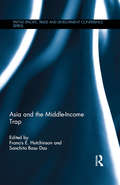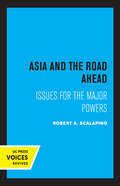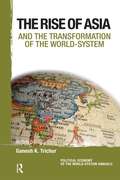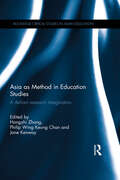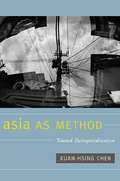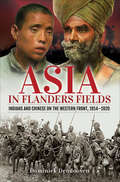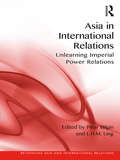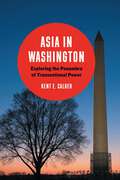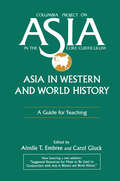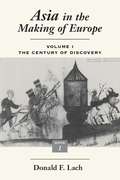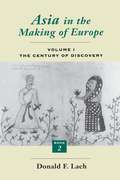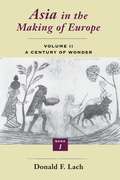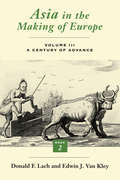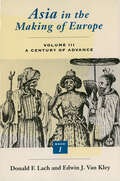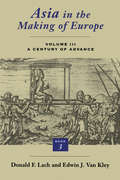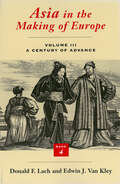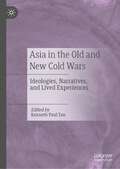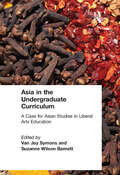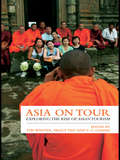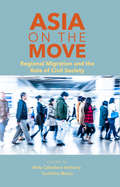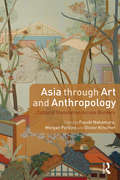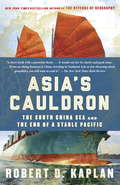- Table View
- List View
Asia and the Middle-Income Trap (PAFTAD (Pacific Trade and Development Conference Series))
by Francis E. Hutchinson Sanchita Basu DasThe term ‘Middle-Income Trap’ refers to countries which stagnate economically after reaching a certain level of per capita income on the basis of labour- and capital-intensive growth, and are struggling to transition towards more skill-intensive and technology-driven development. It has resonance for the increasing number of countries in Asia who have either languished in middle-income status for extended periods of time, or are worried about growth slow-downs. This book sets outs the conceptual underpinnings of the Middle-Income Trap and explores the various ways it can be defined. It also focuses on the debate surrounding the Middle-Income Trap which questions the appropriate institutional and policy settings for middle-income countries to enable them to continue past the easy phase of economic growth. The book engages with this debate by investigating the role of institutions, human capital, and trade policy in helping countries increase their income levels and by highlighting factors which enable the shift to higher and qualitatively better growth. It questions how the large emerging economies in Asia such as China, Indonesia, and India are currently grappling with the challenges of transitioning from labour-intensive to technology- and knowledge-intensive production, and discusses what can be learnt from the countries that have been able to escape the trap to attain high-income status. Providing a conceptual framework for the Middle-Income Trap, this book will be of interest to students and scholars of Asian Economics, Comparative Economics and Asian Studies.
Asia and the Road Ahead: Issues for the Major Powers
by Robert A. ScalapinoThis title is part of UC Press's Voices Revived program, which commemorates University of California Press’s mission to seek out and cultivate the brightest minds and give them voice, reach, and impact. Drawing on a backlist dating to 1893, Voices Revived makes high-quality, peer-reviewed scholarship accessible once again using print-on-demand technology. This title was originally published in 1975.
Asia and the Transformation of the World-System (Political Economy of the World-System Annuals)
by Ganesh K. TrichurIn this collaboratively authored book world-system scholars critically synthesize Asia's re-emerging centrality despite the myriad financial crises that have punctuated the end of the U.S.-dominated Cold War world order. From different vantage points the authors review the turbulent landscape of the region that points toward a new Asian world order as well as contradictory symptoms and signals. The text highlights the salience of Northeast Asia; the resurgence of Russia and Eurasianism; and the class, gender, and ecological implications of a conflict-ridden regional ascent for the future of the North-South divide and for the struggle between the spirit of Davos and the spirit of Porto Alegre.
Asia as Method in Education Studies: A defiant research imagination (Routledge Critical Studies in Asian Education)
by Jane Kenway Hongzhi Zhang Philip Wing ChanUnlearning and re-inventing the theoretical frameworks of Intercultural and Asian Studies is central to this book as it is to Chen Kuan-Hsing’s evocative Asia as Method; this book’s inspirational source. Chen insists that studies of Asia move beyond their paralysing fixation on the West as either a positive or negative referent and that they develop their own standpoints, reference points and research agendas. Asia as Method in Education Studies, is therefore, a provocative and suggestive exploration of educational ideas imported from the West. Chen’s challenge provokes the writers in this collection to consider the implications of colonial and imperialist forces for education systems, policies and practices as well as for educational research itself. The writers offer examples of what it means to rethink and re-examine education in Asia beyond both the Western imperialist eye and the post-colonial ‘politics of resentment’. Asia as Method in Education Studies combines the diverse research of scholars from various countries of Asia as they consider, for example: Struggles to Construct New Research Imaginations in Response to Chen’s Challenges East-West Dialogue: Three Cases in Chinese Educational Research "Asia as [a] method" of Complexity and Dialogue Generalizing the Self? Asianizing Perspectives on International Education and the Formation of Self Against Asia-centric Methods: Australia-China Theoretic-linguistic Knowledge Co-production Highly anticipated for its novel contemporary perspectives, this book offers researchers specialising in educational studies and policy-making fresh practices of thought.
Asia as Method: Toward Deimperialization
by Kuan-Hsing ChenCentering his analysis in the dynamic forces of modern East Asian history, Kuan-Hsing Chen recasts cultural studies as a politically urgent global endeavor. He argues that the intellectual and subjective work of decolonization begun across East Asia after the Second World War was stalled by the cold war. At the same time, the work of deimperialization became impossible to imagine in imperial centers such as Japan and the United States. Chen contends that it is now necessary to resume those tasks, and that decolonization, deimperialization, and an intellectual undoing of the cold war must proceed simultaneously. Combining postcolonial studies, globalization studies, and the emerging field of "Asian studies in Asia," he insists that those on both sides of the imperial divide must assess the conduct, motives, and consequences of imperial histories. Chen is one of the most important intellectuals working in East Asia today; his writing has been influential in Taiwan, South Korea, Hong Kong, Japan, Singapore, and mainland China for the past fifteen years. As a founding member of the Inter-Asia Cultural Studies Society and its journal, he has helped to initiate change in the dynamics and intellectual orientation of the region, building a network that has facilitated inter-Asian connections. Asia as Method encapsulates Chen's vision and activities within the increasingly "inter-referencing" East Asian intellectual community and charts necessary new directions for cultural studies.
Asia in Flanders Fields: Indians and Chinese on the Western Front, 1914–1920
by Dominiek DendoovenThe First World War brought peoples from five continents to support the British and French Allies on the Western Front. Many were from colonial territories in the British and French empires, and the largest contingents were Indians and Chinese - some 140,000. It is a story of the encounter with the European 'other', including the civilian European local populations, often marred by racism, discrimination and zenophobia both inside and outside the military command, but also lightened by moving and enduring 'human' social relationships. The vital contribution to the Alles and the huge sacrifices involved were scarcely recognised at the Paris Peace Conference in 1918 or the post-war victory celebrations and this led to resentment - see huge media coverage in 2021. The effect of the European 'other' experience enhanced Asian political awareness and self-confidence, and stimulated anti-imperialism and proto-nationalism. This is a vivid and original contribution to imperial decline from the First World War. and the originality of the work is enhanced by rare sources culled from original documents and 'local' European fieldwork - in French, German and Flemish.
Asia in International Relations: Unlearning Imperial Power Relations (Rethinking Asia and International Relations)
by L.H.M. Ling Pinar BilginAsia in International Relations decolonizes conventional understandings and representations of Asia in International Relations (IR). This book opens by including all those geographical and cultural linkages that constitute Asia today but are generally ignored by mainstream IR. Covering the Indian subcontinent, Turkey, the Mediterranean, Iran, the Arab world, Ethiopia, and Central-Northeast-Southeast Asia, the volume draws on rich literatures to develop our understanding of power relations in the world’s largest continent. Contributors "de-colonize", "de-imperialize", and "de-Cold War" the region to articulate an alternative narrative about Asia, world politics, and IR. This approach reframes old problems in new ways with the possibility of transforming them, rather than recycling the same old approaches with the same old "intractable" outcomes.
Asia in Washington
by Kent E. CalderFor several centuries, international relations has been primarily the purview of nation-states. Key powers have included at various times Great Britain, France, Japan, China, Russia (then the U.S.S.R., and then Russia again), and the nation most influential in international relations for the past several decades has been the United States. But in a world growing smaller, with a globalizing system increasing in complexity by the day, the nation-state paradigm is not as dominant as it once was.In Asia in Washington, longtime Asia analyst Kent Calder examines the concept of "global city" in the context of international affairs. The term typically has been used in an economic context, referring to centers of international finance and commerce such as New York, Tokyo, and London. But Calder extends the concept to political centers as well--particularly in this case, Washington, D.C.Improved communications, enhanced transportation, greater economic integration and activity have created a new economic village, and global political cities are arising within the new structure--distinguished not by their CEOs or stock markets but by their influence over policy decisions, and their amassing of strategic intelligence on topics from national policy trends to geopolitical risk. Calder describes the rise of Washington, D.C., as perhaps the preeminent global political city--seat of the world's most powerful government, center of NGO and multilateral policy activity, the locale of institutions such as the World Bank and IMF, and home to numerous think tanks and universities.Within Washington, the role of Asia is especially relevant for several reasons. It represents the core of the non-Western industrialized world and the most challenge to Western dominance. It also raises the delicate issue of how race matters in international global governance--a factor crucially important during a time of globalization. And since Asia developed later than the West, its changing role in Washington raises major issues regarding how rising powers assimilate themselves into global governance structure. How do Asian nations establish, increase, and leverage their Washington presence, and what is the impact on Washington itself and the decisions made there? Kent Calder explains it all in Asia in Washington.
Asia in Washington
by Kent E. CalderFor several centuries, international relations has been primarily the purview of nation-states. Key powers have included at various times Great Britain, France, Japan, China, Russia (then the U.S.S.R., and then Russia again), and the nation most influential in international relations for the past several decades has been the United States. But in a world growing smaller, with a globalizing system increasing in complexity by the day, the nation-state paradigm is not as dominant as it once was.In Asia in Washington, longtime Asia analyst Kent Calder examines the concept of "global city" in the context of international affairs. The term typically has been used in an economic context, referring to centers of international finance and commerce such as New York, Tokyo, and London. But Calder extends the concept to political centers as well-particularly in this case, Washington, D.C.Improved communications, enhanced transportation, greater economic integration and activity have created a new economic village, and global political cities are arising within the new structure-distinguished not by their CEOs or stock markets but by their influence over policy decisions, and their amassing of strategic intelligence on topics from national policy trends to geopolitical risk.Calder describes the rise of Washington, D.C., as perhaps the preeminent global political city-seat of the world's most powerful government, center of NGO and multilateral policy activity, the locale of institutions such as the World Bank and IMF, and home to numerous think tanks and universities.Within Washington, the role of Asia is especially relevant for several reasons. It represents the core of the non-Western industrialized world and the most challenge to Western dominance. It also raises the delicate issue of how race matters in international global governance-a factor crucially important during a time of globalization. And since Asia developed later than the West, its changing role in Washington raises major issues regarding how rising powers assimilate themselves into global governance structure. How do Asian nations establish, increase, and leverage their Washington presence, and what is the impact on Washington itself and the decisions made there? Kent Calder explains it all in Asia in Washington.
Asia in Western and World History: A Guide for Teaching (Columbia Project On Asia In The Core Curriculum Ser.)
by Carol Gluck Ainslie T. EmbreeA guide aimed at introducing students to the history of Asia in conjunction with Western and world history.
Asia in the Making of Europe, Volume I: The Century of Discovery. Book 1.
by Donald F. LachPraised for its scope and depth, Asia in the Making of Europe is the first comprehensive study of Asian influences on Western culture. <P><P>For volumes I and II, the author has sifted through virtually every European reference to Asia published in the sixteenth-century; he surveys a vast array of writings describing Asian life and society, the images of Asia that emerge from those writings, and, in turn, the reflections of those images in European literature and art. <P><P>This monumental achievement reveals profound and pervasive influences of Asian societies on developing Western culture; in doing so, it provides a perspective necessary for a balanced view of world history. <P><P> Volume I: The Century of Discovery brings together "everything that a European could know of India, Southeast Asia, China, and Japan, from printed books, missionary reports, traders' accounts and maps" (The New York Review of Books). Volume II: A Century of Wonder examines the influence of that vast new body of information about Asia on the arts, institutions, literatures, and ideas of sixteenth-century Europe.
Asia in the Making of Europe, Volume I: The Century of Discovery. Book 2.
by Donald F. LachPraised for its scope and depth, Asia in the Making of Europe is the first comprehensive study of Asian influences on Western culture. For volumes I and II, the author has sifted through virtually every European reference to Asia published in the sixteenth-century; he surveys a vast array of writings describing Asian life and society, the images of Asia that emerge from those writings, and, in turn, the reflections of those images in European literature and art. This monumental achievement reveals profound and pervasive influences of Asian societies on developing Western culture; in doing so, it provides a perspective necessary for a balanced view of world history. Volume I: The Century of Discovery brings together "everything that a European could know of India, Southeast Asia, China, and Japan, from printed books, missionary reports, traders' accounts and maps" (The New York Review of Books). Volume II: A Century of Wonder examines the influence of that vast new body of information about Asia on the arts, institutions, literatures, and ideas of sixteenth-century Europe.
Asia in the Making of Europe, Volume II: A Century of Wonder. Book 1: The Visual Arts
by Donald F. LachThis is the second volume in a series that traces, century by century, the role of Asia in the making of Europe. The rise to world dominance of the Western nations in modern times and the rapid industrial growth of the West, which outpaced the East in technical and military achievements, have led to a historical eclipse of the ancient and brilliant cultures of Asia. Historican Donald F. Lach, in his influential scholarly work, Asia in the Making of Europe, points out that an eclipse is never permanent, that this one was never total, and that there was a period in early modern times when Asia and Europe were close rivals in brilliance and mutual influence.
Asia in the Making of Europe, Volume III: A Century of Advance. Book 2, South Asia
by Donald F. Lach Edwin J. Van KleyThis monumental series, acclaimed as a "masterpiece of comprehensive scholarship" in the New York Times Book Review, reveals the impact of Asia's high civilizations on the development of modern Western society. The authors examine the ways in which European encounters with Asia have altered the development of Western society, art, literature, science, and religion since the Renaissance. In Volume III: A Century of Advance, the authors have researched seventeenth-century European writings on Asia in an effort to understand how contemporaries saw Asian societies and peoples.
Asia in the Making of Europe, Volume III: A Century of Advance. Book 1: Trade, Missions, Literature
by Donald F. Lach Edwin J. Van KleyThis monumental series, acclaimed as a "masterpiece of comprehensive scholarship" in the New York Times Book Review, reveals the impact of Asia's high civilizations on the development of modern Western society. The authors examine the ways in which European encounters with Asia have altered the development of Western society, art, literature, science, and religion since the Renaissance. In Volume III: A Century of Advance, the authors have researched seventeenth-century European writings on Asia in an effort to understand how contemporaries saw Asian societies and peoples.
Asia in the Making of Europe, Volume III: A Century of Advance. Book 3: Southeast Asia
by Donald F. Lach Edwin J. Van KleyThis monumental series, acclaimed as a "masterpiece of comprehensive scholarship" in the New York Times Book Review, reveals the impact of Asia's high civilizations on the development of modern Western society. The authors examine the ways in which European encounters with Asia have altered the development of Western society, art, literature, science, and religion since the Renaissance. In Volume III: A Century of Advance, the authors have researched seventeenth-century European writings on Asia in an effort to understand how contemporaries saw Asian societies and peoples. Book 3: Southeast Asia examines European images of the lands, societies, religions, and cultures of Southeast Asia. The continental nations of Siam, Vietnam, Malaya, Pegu, Arakan, Cambodia, and Laos are discussed, as are the islands of Java, Bali, Sumatra, Borneo, Amboina, the Moluccas, the Bandas, Celebes, the Lesser Sundas, New Guinea, Australia, New Zealand, the Philippines, Mindanao, Jolo, Guam, and the Marianas.
Asia in the Making of Europe, Volume III: A Century of Advance. Book 3: Southeast Asia
by Donald F. Lach Edwin J. Van KleyThis monumental series, acclaimed as a "masterpiece of comprehensive scholarship" in the New York Times Book Review, reveals the impact of Asia's high civilizations on the development of modern Western society. The authors examine the ways in which European encounters with Asia have altered the development of Western society, art, literature, science, and religion since the Renaissance. In Volume III: A Century of Advance, the authors have researched seventeenth-century European writings on Asia in an effort to understand how contemporaries saw Asian societies and peoples. Book 3: Southeast Asia examines European images of the lands, societies, religions, and cultures of Southeast Asia. The continental nations of Siam, Vietnam, Malaya, Pegu, Arakan, Cambodia, and Laos are discussed, as are the islands of Java, Bali, Sumatra, Borneo, Amboina, the Moluccas, the Bandas, Celebes, the Lesser Sundas, New Guinea, Australia, New Zealand, the Philippines, Mindanao, Jolo, Guam, and the Marianas.
Asia in the Making of Europe, Volume III: A Century of Advance. Book 4: East Asia
by Donald F. Lach Edwin J. Van KleyThis monumental series, acclaimed as a "masterpiece of comprehensive scholarship" in the New York Times Book Review, reveals the impact of Asia's high civilizations on the development of modern Western society. The authors examine the ways in which European encounters with Asia have altered the development of Western society, art, literature, science, and religion since the Renaissance. In Volume III: A Century of Advance, the authors have researched seventeenth-century European writings on Asia in an effort to understand how contemporaries saw Asian societies and peoples.
Asia in the Making of Europe: Volume III, A Century of Advance
by Donald F. Lach Edwin J. Van KleyThis monumental series, acclaimed as a "masterpiece of comprehensive scholarship" in the New York Times Book Review, reveals the impact of Asia's high civilizations on the development of modern Western society. The authors examine the ways in which European encounters with Asia have altered the development of Western society, art, literature, science, and religion since the Renaissance. In Volume III: A Century of Advance, the authors have researched seventeenth-century European writings on Asia in an effort to understand how contemporaries saw Asian societies and peoples.
Asia in the Old and New Cold Wars: Ideologies, Narratives, and Lived Experiences
by Kenneth Paul TanThis is a collection of essays marking the 30th anniversary of the historic Cold War’s formal conclusion in 1991. It enriches Cold War studies—a field dominated by Political Science, International Relations, and History—with insights from Sociology, Anthropology, Cultural Studies, and Film and Media Studies. Through critical analysis of newspaper and magazine articles, films, novels, art exhibits, museums, and other commemorative sites that engage with the themes of conflict, violence, trauma, displacement, marginalization, ecology, and identity, the book provides rich and diverse perspectives on the complex relationship between the historic Cold War and its legacies on the one hand and, on the other, their impact on Asia, its plural histories and peoples, and their shifting identities, ideological beliefs, and lived experiences. Today, we often speak of an ‘Asian century’ and witness intensifying concerns over ‘new cold wars’ or ‘Cold War 2.0’. A United States in decline and a China on the rise create conditions for a new superpower rivalry, with a trade war already being fought between the two competitors. Russia continues to flex its geopolitical muscles, launching a full-scale invasion of neighbouring Ukraine in 2022, as its strongman leadership yearns nostalgically for the good old days of the USSR. As grand narratives and strategies of the Cold War jostle to make sense of high-level geopolitical events, this book descends to the level of lived experience, zooming in on ordinary and marginalized peoples, whose lives and livelihoods have been affected over the decades by the Cold War and its legacies.
Asia in the Undergraduate Curriculum: A Case for Asian Studies in Liberal Arts Education
by Van Jay Symons Suzanne Wilson BarnettThe contributors place the development of Asian studies programs in small colleges in historical context, make a compelling case for the inclusion of Asian studies in the liberal arts curriculum, and consider the challenges faced in developing and sustaining Asian studies programs and ways of meeting such challenges now and in the future.
Asia on Tour: Exploring the rise of Asian tourism
by Tim Winter Peggy Teo T. C. ChangWith the vast majority of academic theory on tourism based onWestern tourists, Asia on Tour illustrates why the rapid growth of travel for leisure and recreation in Asia demands a reappraisal of how tourism is analyzed and understood. Examining domestic and intra-regional tourism, the book reveals how improvements in infrastructures, ever increa
Asia on the Move: Regional Migration and the Role of Civil Society
by Mely Caballero-Anthony Toshihiro MenjuGlobalization has led to a surge in cross-border migration, leading the number of international migrants in East Asia to more than double over the past two decades. Carefully managed migration can spark economic growth and innovation, while helping destination countries with aging populations overcome human resource constraints. However, irregular migration has been on the rise as well, which not only places migrants in a vulnerable position with no legal recourse but also is linked to trafficking, smuggling, and even terrorism. Clearly, migration-whether regular or irregular-needs to be managed more effectively to handle the expanding and increasingly complex flows of people as well as the human security challenges they bring. In this volume, experts from "sending" and "receiving" countries in Northeast and Southeast Asia identify current migration trends, analyze government efforts to manage migration, and explore the unique role that nongovernmental organizations can play in helping to protect migrants and to harness migration to the benefit of the region.
Asia through Art and Anthropology: Cultural Translation Across Borders (Criminal Practice Ser.)
by Fuyubi Nakamura Morgan Perkins Olivier Krischer Howard Morphy* AWARDED BEST ANTHOLOGY BY THE ART ASSOCIATION OF AUSTRALIA AND NEW ZEALAND *How has Asia been imagined, represented and transferred both literally and visually across linguistic, geopolitical and cultural boundaries? This book explores the shifting roles of those who produce, critique and translate creative forms and practices, for which distinctions of geography, ethnicity, tradition and modernity have become fluid. Drawing on accounts of modern and contemporary art, film, literature, fashion and performance, it challenges established assumptions of the cultural products of Asia.Special attention is given to the role of cultural translators or 'long-distance cultural specialists' whose works bridge or traverse different worlds, with the inclusion of essays by three important artists who share personal accounts of their experiences creating and showing artworks that negotiate diverse cultural contexts.With contributions from key scholars of Asian art and culture, including art historian John Clark and anthropologist Clare Harris, alongside fresh voices in the field, Asia Through Art and Anthropology will be essential reading for students and scholars of anthropology, art history, Asian studies, visual and cultural studies.----------------------------------------------------------------------------------------------------------The publication of the color plates of works by Phaptawan Suwannakudt and Savanhdary Vongpoothorn is funded by the Australian Government.
Asia's Cauldron: The South China Sea and the End of a Stable Pacific
by Robert D. KaplanFrom Robert D. Kaplan, named one of the world's Top 100 Global Thinkers by Foreign Policy magazine, comes a penetrating look at the volatile region that will dominate the future of geopolitical conflict. Over the last decade, the center of world power has been quietly shifting from Europe to Asia. With oil reserves of several billion barrels, an estimated nine hundred trillion cubic feet of natural gas, and several centuries' worth of competing territorial claims, the South China Sea in particular is a simmering pot of potential conflict. The underreported military buildup in the area where the Western Pacific meets the Indian Ocean means that it will likely be a hinge point for global war and peace for the foreseeable future. In Asia's Cauldron, Robert D. Kaplan offers up a vivid snapshot of the nations surrounding the South China Sea, the conflicts brewing in the region at the dawn of the twenty-first century, and their implications for global peace and stability. One of the world's most perceptive foreign policy experts, Kaplan interprets America's interests in Asia in the context of an increasingly assertive China. He explains how the region's unique geography fosters the growth of navies but also impedes aggression. And he draws a striking parallel between China's quest for hegemony in the South China Sea and the United States' imperial adventure in the Caribbean more than a century ago. To understand the future of conflict in East Asia, Kaplan argues, one must understand the goals and motivations of its leaders and its people. Part travelogue, part geopolitical primer, Asia's Cauldron takes us on a journey through the region's boom cities and ramshackle slums: from Vietnam, where the superfueled capitalism of the erstwhile colonial capital, Saigon, inspires the geostrategic pretensions of the official seat of government in Hanoi, to Malaysia, where a unique mix of authoritarian Islam and Western-style consumerism creates quite possibly the ultimate postmodern society; and from Singapore, whose "benevolent autocracy" helped foster an economic miracle, to the Philippines, where a different brand of authoritarianism under Ferdinand Marcos led not to economic growth but to decades of corruption and crime. At a time when every day's news seems to contain some new story--large or small--that directly relates to conflicts over the South China Sea, Asia's Cauldron is an indispensable guide to a corner of the globe that will affect all of our lives for years to come.Advance praise for Asia's Cauldron "Asia's Cauldron is a perfect summation of the present turbulent moment in history, when the World War II security structure is beginning a rapid transformation. Kaplan engages the striking possibilities of where the current confrontation between China and Japan could lead, and underscores the point that this is a lot more significant than a simple border dispute."--Paul Bracken, Yale University, author of The Second Nuclear Age "Master global strategist Robert D. Kaplan turns his gaze to the bubbling heat of the South China Sea in his latest tour de force. Asia's Cauldron deconstructs the extreme volatility of this enormous, dangerous, and vital maritime space."--Admiral James Stavridis, United States Navy (Ret.), dean of the Fletcher School at Tufts University and Supreme Allied Commander of the North Atlantic Treaty Organization, 2009-2013From the Hardcover edition.
